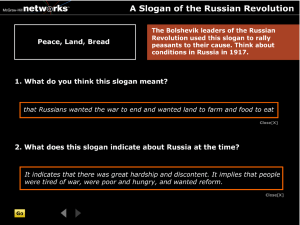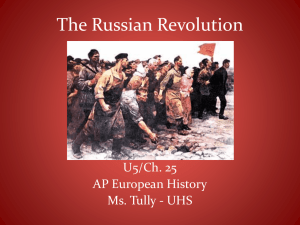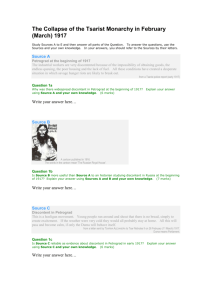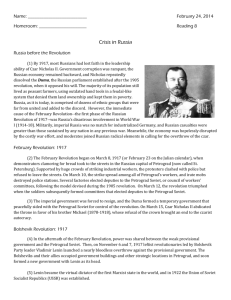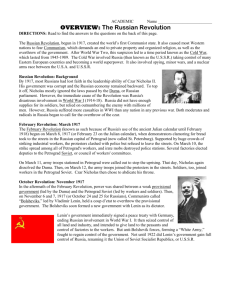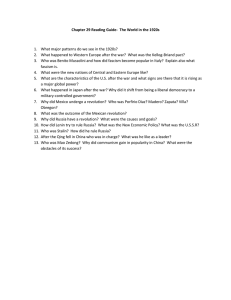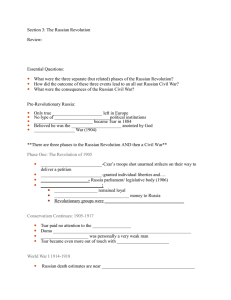Modern European History Unit 7 – Nation-Building and War
advertisement
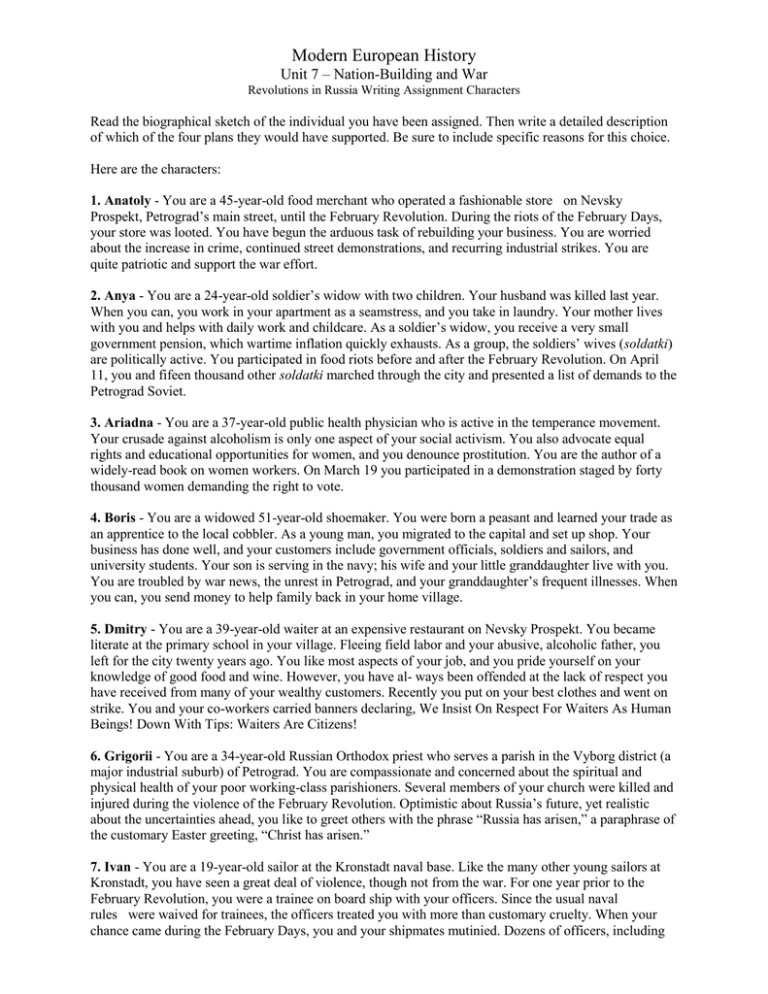
Modern European History Unit 7 – Nation-Building and War Revolutions in Russia Writing Assignment Characters Read the biographical sketch of the individual you have been assigned. Then write a detailed description of which of the four plans they would have supported. Be sure to include specific reasons for this choice. Here are the characters: 1. Anatoly - You are a 45-year-old food merchant who operated a fashionable store on Nevsky Prospekt, Petrograd’s main street, until the February Revolution. During the riots of the February Days, your store was looted. You have begun the arduous task of rebuilding your business. You are worried about the increase in crime, continued street demonstrations, and recurring industrial strikes. You are quite patriotic and support the war effort. 2. Anya - You are a 24-year-old soldier’s widow with two children. Your husband was killed last year. When you can, you work in your apartment as a seamstress, and you take in laundry. Your mother lives with you and helps with daily work and childcare. As a soldier’s widow, you receive a very small government pension, which wartime inflation quickly exhausts. As a group, the soldiers’ wives (soldatki) are politically active. You participated in food riots before and after the February Revolution. On April 11, you and fifeen thousand other soldatki marched through the city and presented a list of demands to the Petrograd Soviet. 3. Ariadna - You are a 37-year-old public health physician who is active in the temperance movement. Your crusade against alcoholism is only one aspect of your social activism. You also advocate equal rights and educational opportunities for women, and you denounce prostitution. You are the author of a widely-read book on women workers. On March 19 you participated in a demonstration staged by forty thousand women demanding the right to vote. 4. Boris - You are a widowed 51-year-old shoemaker. You were born a peasant and learned your trade as an apprentice to the local cobbler. As a young man, you migrated to the capital and set up shop. Your business has done well, and your customers include government officials, soldiers and sailors, and university students. Your son is serving in the navy; his wife and your little granddaughter live with you. You are troubled by war news, the unrest in Petrograd, and your granddaughter’s frequent illnesses. When you can, you send money to help family back in your home village. 5. Dmitry - You are a 39-year-old waiter at an expensive restaurant on Nevsky Prospekt. You became literate at the primary school in your village. Fleeing field labor and your abusive, alcoholic father, you left for the city twenty years ago. You like most aspects of your job, and you pride yourself on your knowledge of good food and wine. However, you have al- ways been offended at the lack of respect you have received from many of your wealthy customers. Recently you put on your best clothes and went on strike. You and your co-workers carried banners declaring, We Insist On Respect For Waiters As Human Beings! Down With Tips: Waiters Are Citizens! 6. Grigorii - You are a 34-year-old Russian Orthodox priest who serves a parish in the Vyborg district (a major industrial suburb) of Petrograd. You are compassionate and concerned about the spiritual and physical health of your poor working-class parishioners. Several members of your church were killed and injured during the violence of the February Revolution. Optimistic about Russia’s future, yet realistic about the uncertainties ahead, you like to greet others with the phrase “Russia has arisen,” a paraphrase of the customary Easter greeting, “Christ has arisen.” 7. Ivan - You are a 19-year-old sailor at the Kronstadt naval base. Like the many other young sailors at Kronstadt, you have seen a great deal of violence, though not from the war. For one year prior to the February Revolution, you were a trainee on board ship with your officers. Since the usual naval rules were waived for trainees, the officers treated you with more than customary cruelty. When your chance came during the February Days, you and your shipmates mutinied. Dozens of officers, including the base commander, were murdered or imprisoned in dungeons. You like to read radical political pamphlets. 8. Katya - You are a 20-year-old law student at the University of St. Petersburg. Your father comes from the nobility and served in the tsar’s ministry of finance. You have an intelligent, diligent, and creative spirit. You see yourself as a future contributor to a new Russia. You took part in the March 19 protest in which forty thousand women demanded the right to vote. Your boyfriend, whom you have known since childhood, is a young army officer. 9. Lidiia - You are a 23-year-old army nurse with two years’ service at the front. You are home on leave. For your valor, you were awarded the St. Olga’s women’s service medal by the tsar himself. You are fiercely loyal to your comrades, especially brave Mikhail, your lover. You despise the Germans and hope for victory. At the same time, you are aware that the war is going badly and you are sick of all the blood and death. 10. Natasha - You are a 30-year-old coal miner. Your mine is on strike, and you are in Petrograd helping your sister’s family while she is going through a difficult pregnancy. Your brother-in-law is a soldier at the front. You and your husband, also a coal miner, have two children of your own at home. You are physically and emotionally strong, but you also have many fears. You miss your husband and children, you are worried about your sister, you wonder when the miners’ strike will end, and you are distressed by the turmoil in Petrograd. 11. Nikolai - You are a married 42-year-old postal clerk. Your three children attend school. You have helped organize a postal clerks’ union, which has successfully sought an eight-hour day and a wage increase. You favor the election of managers in the postal service. You are weary of poor housing, dirty drinking water, and food shortages. You feel optimistic that the revolution will bring positive results to your union and to Russia as a whole. 12. Nina - You are a 38-year-old housewife. You live with your husband (a shipyard worker) and two children in one room of an apartment. To make ends meet, you take in laundry. You also sublet the apartment’s other room to another family. Like many working- class housewives, you are illiterate. Despite your pleas, your husband drinks too much vodka. Sometimes, when he has had too much to drink, he beats you. You dream of a better life, including an education for your children. 13. Olga - You are a 25-year-old textile worker from the Vyborg district. You were one of the demonstrators whose protests on February 23 sparked the revolution. You are married to a metal worker, and you have two little children at home, who are cared for during the day by an elderly neighbor. Father Grigorii is your parish priest. 14. Sergei - You are a 49-year-old peasant. You live in a village on the Volga River near Yaroslavl. You are in Petrograd visiting your only son, a metal worker, who was shot by soldiers during the February Days demonstrations. While this four hundred-mile journey was difficult and expensive, seeing your son has been worth every ruble. You plan to return home in several weeks for the spring planting. 15. Svetlana - You are a 36-year-old maid at the home of a wealthy industrialist, Konstantin Kuryakin. Your husband, Vadim, is a 38-year-old army sergeant at the front. Your 20-year-old son serves in the navy, and your twin 16-year-old daughters work as domestic servants in the Kuryakin household. You are proud that your family supports the war effort, but you live in constant fear for your husband and son. You send money back to family in your home village whenever you can do so. 16. Vladimir - You are a 32-year-old army sergeant in the Petrograd garrison. Known for your courage and leadership ability, you were wounded at the front and reassigned to a unit in Petrograd to recover. Your unit consists largely of older reservists, mostly family men. During the February Revolution, horrified by the cruelty of the Cossacks, you persuaded your fellow soldiers to mutiny. In March, you were elected by your regiment to represent it in the Petrograd Soviet. You have a wife and three children at home.
